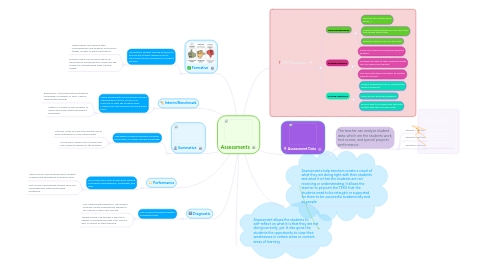
1. Formative
1.1. This gathers student learning evidence to provide the student feedback and to adjust instructional strategies for student success.
1.1.1. Observations: We observe their comprehension and usage of information taught, in order to adjust instruction.
1.1.2. Quizzes: These can be quick check-up performance assessments to make sure the student is understanding what is being taught.
2. Interim/Benchmark
2.1. These assessments are performed during a standardized set time, giving us an overview of what the students have retained from the teachings we have given them.
2.1.1. Benchmark: A test that outlines students knowledge of subjects or skills. Used to show student growth.
2.1.2. Midterm: a middle of the semester or school year exam that tests student knowledge.
3. Summative
3.1. This gathers students academic rendition information, to assess student knowledge.
3.1.1. Tutoring: Gives us more time and the use of other strategies to close learning gaps.
3.1.2. Group work: Allows one to provide the extra support needed for the students.
4. Performance
4.1. This is the rate or level at which the student is showing comprehension, knowledge, and skills.
4.1.1. Report Cards: Demonstrate overall student achievement throughout a period of time.
4.1.2. Test Scores: Demonstrate student skills and comprehension after being taught something.
5. Diagnostic
5.1. This involves analyzing students' assessment data.
5.1.1. Self-Assessment/Reflection: The student analyzes results alongside the teacher to self-reflect on their own learning.
5.1.2. Teacher based: The teacher is the one in charge of analyzing the data from a text or quiz, to reflect on their teaching.
6. Assessment Data
6.1. The teacher can analyze student data; which are the students work, test scores, and special projects performance.
6.1.1. Student 1: 70/100
6.1.2. Student 2: 60/100
6.1.3. Student 3: 40/100
7. HOT Questions
7.1. Opening Questions:
7.1.1. What do you already know about _______________?
7.1.2. Is there something that you can infer from just looking at the title?
7.1.3. What are asked to do from this text?
7.2. Guiding quesions
7.2.1. Could you make any connection the text already?
7.2.2. Are there any text to text connections that you can make from the text
7.2.3. Can you relate this information to another subject or topic?
7.3. Closing Questions
7.3.1. Is there a different point of view that we haven't looked at?
7.3.2. How can you solve the situation?
7.3.3. Are you able to compare this text with another text that you have read?

